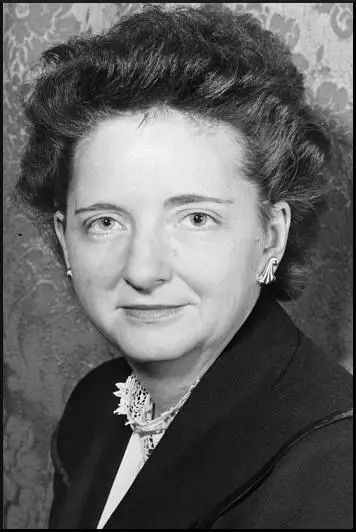Joseph Katz
Joseph Katz was born in Lithuania in 1912. He moved to New York City and became a member of the Communist Party of the United States (CPUSA). He joined the Soviet spy network led by Jacob Golos. His codename was "X". It has been suggested that he might have been involved in the death of Walter Krivitsky in February 1941. (1) After the death of Golos he worked under Iskhak Akhmerov. Katz's agents included Earl Browder and Harry Gold. (2)
Katz first met Elizabeth Bentley in October, 1944. Bentley later recalled that her new handler was "not at all meticulous about his personal appearance". (3) His gray suits, brown shoes, and colorless personality helped him blend into any crowd. He was only in his mid-thirties, but his receding hairline and pronounced limp made him look much older. Elizabeth noted his Jewish nose and East Side accent. His English was so good that she thought he might be a native-born American." (4) When Bentley asked if he was born in Russia he replied: "I'm not Russian - I'm a Lithuanian and proud of it." (5)
Joseph Katz - Soviet Spy
Duncan Chaplin Lee, an important agent inside Office of Strategic Services (OSS), did not get on with Elizabeth Bentley so it was decided to transfer him to Joseph Katz. However, on 3rd February, 1945, Katz reported to Anatoly Gorsky: "Saw (Lee) last night. After beating his chest about what a coward he is, how sorry he feels about it, etc., he told me he must stick to his decision to quit. Though I agreed to meet again in case of necessity, in my opinion, there is no sense in using him. He is totally frightened and depressed. He suffers from nightmares where he sees his name on lists (of accused Communists within OSS), his life is destroyed, etc." (6) NKVD instructed Gorsky to use Lee as a "talent-spotter" within the OSS. However, after Judith Coplon in the Justice Department of the FBI warned that investigations would soon begin on all previous leads on Communist sources within the government, Gorsky was ordered to cease all contact with Lee. (7)
Elizabeth Bentley
On 7th November, 1945, Elizabeth Bentley had a meeting with the FBI. The following day J. Edgar Hoover, sent a message to Harry S. Truman confirming that an espionage ring was operating in the United States government. (8) Hoover attempted to keep Bentley's defection a secret. The plan was for her to "burrow-back" into the Soviet underground in America in order to get evidence against dozens of spies. However, it was Hoover's decision to tell William Stephenson, the head of head of British Security Coordination about Bentley, that resulted in the Soviets becoming aware of her defection. Stephenson told Kim Philby and on 20th November, 1945, he informed NKVD of her betrayal. (9) On 23rd November, Moscow sent a message to all station chiefs to "cease immediately their connection with all persons known to Bentley in our work and to warn the agents about Bentley's betrayal". (10)

Anatoly Gorsky now sent a memorandum to Moscow about Bentley. (11) Allen Weinstein has pointed out: "Gorsky discussed and rejected in his November 27 memo a variety of options: shooting Bentley (too noisy), arranging a car or subway accident (too risky), and faking a suicide (too chancy). In connection with the last option, Gorsky noted that he had selected agent "X" (Joseph Katz) for the task of eliminating Bentley... In the end, Gorsky decided that a slow-acting poison should be administered to Bentley, something "X" could place on a pillow or handkerchief or in her food." (12)
Joseph Katz - Assassin
Gorsky warned NKVD headquarters that Joseph Katz was not in good health and that Bentley might cause him problems as he was "a very strong, tall and healthy woman, and "X" was not feeling well lately". (13) Eventually Gorsky was told that: "No measures should be taken with regard to (Bentley)." Gorsky was informed by Vsevolod Merkulov that it had been decided that Lavrentiy Beria would deal with Bentley. (14) However, on 16th August, 1947, Katz met the NKVD station chief in Paris to discuss the elimination of Bentley. It was reported that Katz was willing to take the assignment but at the last minute it was decided to abandon the idea. (15)
Katz remained in France until 1951 before moving to Israel where he died in 2004.
Primary Sources
(1) Allen Weinstein, The Hunted Wood: Soviet Espionage in America (1999)
Gorsky discussed and rejected in his November 27 memo a variety of options: shooting Bentley (too noisy), arranging a car or subway accident (too risky), and faking a suicide (too chancy). In connection with the last option, Gorsky noted that he had selected agent "X" (Joseph Katz) for the task of eliminating Bentley... In the end, Gorsky decided that a slow-acting poison should be administered to Bentley, something "X" could place on a pillow or hankerchief or in her food.
